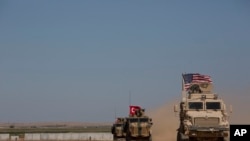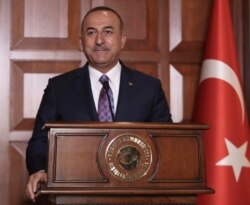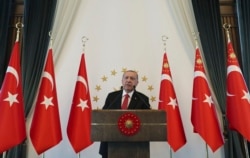Diplomatic tensions are escalating between Turkey and the United States over Syria. Ankara is accusing Washington of duplicity in a deal struck between the two militaries to create a buffer zone in Syrian territory to address Turkish security and refugee concerns.
"The U.S. is only taking cosmetic steps as part of the safe zone agreement," Turkish Foreign Minister Mevlut Cavusoglu told reporters Tuesday.
In August, Turkish and American generals reached an agreement under which the two militaries would create a buffer zone in northeast Syria. The area was intended to protect the Turkish border from the YPG, a Kurdish militia designated by Ankara as terrorists linked to an insurgency inside Turkey.
On Monday, the U.S. military claimed the agreement was on track. "The U.S. and Turkey are working together to rapidly implement the security mechanism and are on time or ahead of schedule in many areas," read a statement by U.S. Central Command.
Sunday saw the first joint U.S.-Turkish military patrol into northeastern Syria. The American military said heavy YPG fortifications close to the Turkish border also were destroyed as part of the agreement.
Ankara remains deeply suspicious of Washington, however, because the YPG is a close ally in its war against Islamic State.
"We highlight to the Turks that we take very seriously their security interests in the region," said a senior U.S. defense official Friday in a background briefing to reporters. "At the same time protecting our ongoing need to conduct the de-ISIS campaign in northeast Syria."
While "welcoming" Washington's cooperation, President Recep Tayyip Erdogan made clear his patience was running out Tuesday.
"Sending 50,000 trucks of equipment and ammunition to the [YPG] terrorists so far has really bothered us," Erdogan said. "Against who are these [weapons] used? Against Turkey. It is not possible for us to accept this as a strategic partner."
Erdogan set a September deadline for Washington to fully implement the August military agreement. Ankara is warning it will unilaterally intervene in Syria if the U.S. doesn't comply.
Analysts point out, though, the two NATO allies appear still not to have agreed on details of the buffer zone. Ankara is demanding a zone that is 40 kilometers deep under Turkish control, while Washington reportedly has agreed to a zone just 10 kilometers into Syria.
Refugees in Turkey
Erdogan is driven by growing public pressure in Turkey to return some of the 3.5 million Syrian refugees in Turkey back to Syria. "It's certainly a very, very serious, important priority, because of the rising political discontent over the issue," said International Relations lecturer Soli Ozel of Istanbul's Kadir Has University.
"Our expectation from the United States is to stand with us in our fight against terror and our efforts to establish safe zones where the refugees can return to," Erdogan said Tuesday.
Turkey is facing another refugee exodus. The Turkish Red Crescent said Tuesday that more than a half-million Syrians in Idlib province have fled to the Turkish border to escape a recent offensive by Syrian forces.
While Erdogan warned Tuesday that Turkey was unable to take any more refugees, some experts are questioning the Turkish president's threat of unilaterally intervening in Syria.
"Of course, the rhetoric of the Turkish government is different from actions. Actions are more difficult than talking," said retired Turkish General Haldun Solmazturk, who now heads the 21st Century Institute, an Ankara-based research group.
"It's not about invading Syria and establishing a safe zone along the Syrian border. It's about the aftermath," he added. "How will we stay there? How will we supply it? How will you govern and administer it? There are such great and important challenges after the invasion. Without American support, it's a fanciful dream," Solmazturk said.
Erdogan-Trump meeting
Analysts suggest Erdogan will be looking to his relationship with U.S. President Donald Trump to break the current impasse. The two leaders are scheduled to meet next week on the sidelines of the United Nations General Assembly meeting in New York.
"They [Ankara] feel Trump is the most sympathetic voice in Washington toward President Erdogan, whereas they look at other Washington institutions through very negative lenses," said international relations expert Galip Dalay, a visiting scholar at Oxford University. "Even though historically the [U.S.] military was the backbone of U.S.-Turk relations, now military ties are quite frayed between both countries."
Ankara's strategy appears well-founded given that Trump is credited with Washington stepping back from threatened sanctions over Turkey's purchase of Russian S-400 missiles.
"President Trump recently met with senators and asked for flexibility in terms of sanctions," said retired general Solmazturk. "But if a unilateral Turkish military operation [in Syria] comes about, then President Trump would lose all the flexibility given by Congress, and some serious sanctions would become inevitable.That would be detrimental to the Turkish economy, to Turkish-U.S. relations, and relations with the West and, perhaps, NATO relations."
In what is being interpreted by some as a warning to Ankara, U.S. Treasury Secretary Steve Mnuchin confirmed Monday that sanctions against Turkey were on the agenda. "We're looking at that, I'm not going to make any comments on any specific decisions, but we are looking at it," Mnuchin told reporters.







